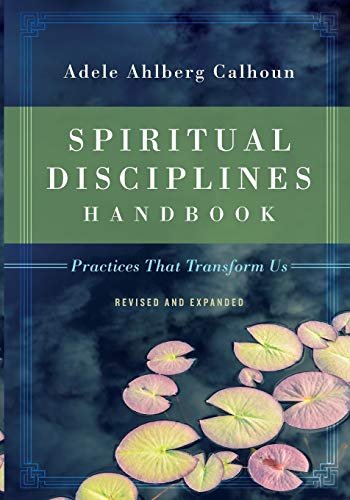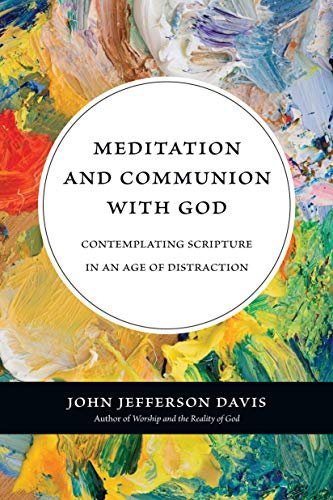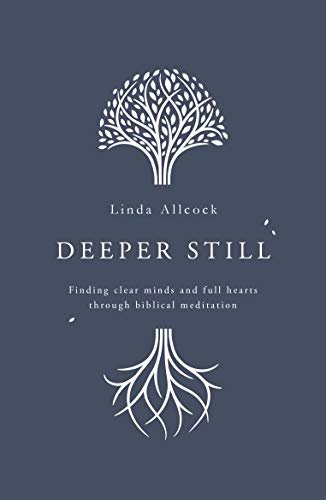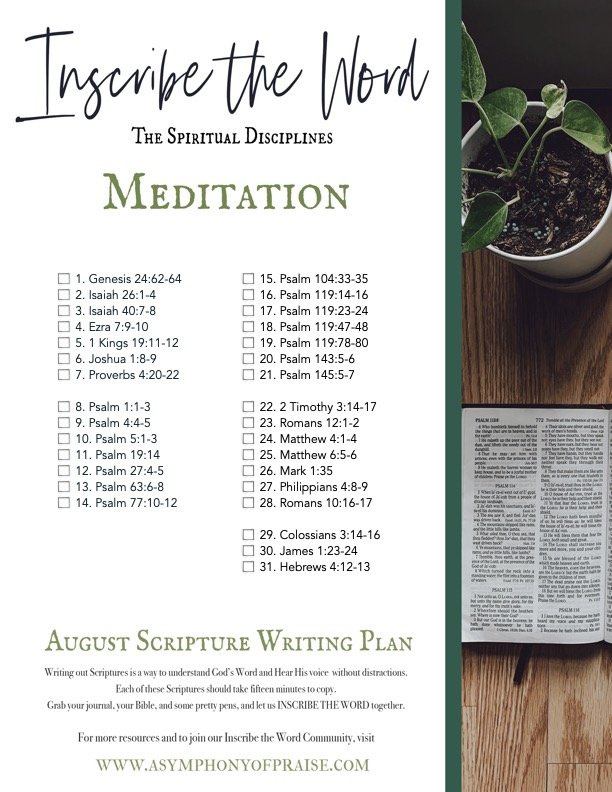Inscribe the Word . . . Meditation.
I began Inscribe the Word Scripture Writing Plans in 2016, and every year, I am in awe of how God uses these plans to bring hundreds of thousands of people to Scripture. I am humbled and honored to bring this resource to you.
This year, our theme is The Spiritual Disciplines. By placing daily spiritual rhythms in our lives, my husband and I have decided to rebuild our lives around our apprenticeship to Jesus.
Each month in 2022, we will focus on a new spiritual discipline. I will also be including some books and resources to help you put that discipline into practice in your everyday lives. In January, we inscribed verses focused on Sabbath Rest. This February, our Scripture passages were on prayer. In March, we continued our study of the Spiritual Disciplines and studied Fasting. In April, we focused on the beauty of Praise & Worship, and in May, Silence and Solitude. In June, we spent our time studying what Scripture says about Hospitality. In July, Celebration. This month, we take on a new discipline . . .
Meditation.
My prayer is that you see these not as legalistic rules but as ways to Abide in the Vine each and every day. (John 15:1-8)
The word "meditation" has many different connotations. When you hear that word, you may think of Scriptural mediation. But you may also think of a yoga class, Eastern spiritual meditation, a TED Talk, or countless self-help books. You may also see mediation as a way to relieve stress and anxiety or to help you become more present in the moment.
Eastern religions and new age gurus teach that meditation is to empty the mind so that there is nothing there. But meditation centered on Judeo-Christian spirituality, opens the mind and fills it with God, His Word, and His presence in the world.
"A major difference between [unBibilical] meditation and biblical meditation is that through Scripture, God speaks to our minds, not "mindlessly." God communicates his truths to us so that we may "know" (see 1 John 5:13), not "un-know." In Romans 12:2, the apostle Paul challenges us to not empty our minds, but to renew our minds. God is the one who places the sentinel to guard what we allow to go into our hearts and minds (see Philippians 4:7).
Meditating in the Old Testament's original Hebrew language means "to mutter, to ruminate." Two images arise. The first is of a person walking around muttering under their breath as if he cannot stop obsessing over a thought. The second is the image of a cow chewing its cud. The idea is chewed, swallowed, regurgitated, chewed again, and swallowed until it is thoroughly absorbed. Meditating is the practice of muttering and ruminating (chewing the cud) on Scripture. It is the most complete form of internalizing God's Word.
These two pictures, muttering and ruminating, give us quite a different way of approaching the Bible. Far from a quick read of a chapter a day, meditating chooses deep over wide. While there is immense value in gaining a broad overview of the stories and themes of Scripture, meditating balances this with the life-altering benefit of making Scripture infuse our very being. Psalm 1 captures the value when it says that for the one who meditates of Scripture, "whatever he does prospers." (source)
As we have been going through The Spiritual Disciplines this year, the words of Adele Ahlberg Calhoun in The Spiritual Disciplines Handbook ring true once again. If you haven’t purchased this book, do it today! It is a treasure.
“Meditation runs counter to our busy culture, where speed reading, first impressions and skimming are as deep as we go. In meditation we gaze at something or someone long and longingly. We seek the treasure and truth of what we see. Just as moving a prism reveals different bands of color, meditation allows God to shine his truth and light into our hearts.
To meditate on Scripture choose a verse, chapter or book of the Bible. Don’t hurry. Listen to the Scripture. Write down your questions. Use your imagination. You may wish to memorize a short part of the text to keep it clearly before you. Like a cow chewing the cud, keep returning to your text with your mind and heart. When you are distracted, gently return to your text. Express once again your desire to pay attention. The impact of meditating on Scripture can show up later in our interactions with others.”
BOOKS, PODCASTS, RESOURCES and WEBSITES
Scripture Meditation Archive by Soul Shepherding
What Does the Bible Say About Meditation by GotQuestions
How To Meditation On God’s Word by Bible Study Tools
As we Inscribe Meditation, let us find space in our hearts and lives to slow down, clear away the noise,
and be with Jesus.











